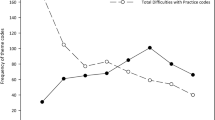Abstract
Theory and research suggest that if participants continue mindfulness practice following mindfulness-based interventions, then they are likely to see greater benefit. However, specific theory about what assists and hinders continued mindfulness practice, following mindfulness-based cognitive therapy (MBCT), is lacking. Therefore, we aimed to develop a theory of participants' post-MBCT engagement with mindfulness practice. Since this was a new area of investigation with the aim of theory generation, we chose a qualitative design employing grounded theory. The first author interviewed 13 participants who had attended MBCT courses. The researchers conducted analysis and interviews in such a way that findings from the first seven interviews could influence subsequent data collection. As is the norm for grounded theory, analysis was iterative, moving between the data and higher-level concepts. We gradually developed a theory around an emergent core category. The theory suggests that participants undergo a “journey of mindfulness”, moving in and out of a “virtuous practice cycle” over time. Various obstacles appear associated with leaving the virtuous cycle and integrating mindfulness into one's lifestyle seems an important component of the cycle. This theory contains aspects not included in previous models and could provide an aid to MBCT course facilitators in their efforts to encourage post-MBCT mindfulness practice.

Similar content being viewed by others
References
Ajzen, I. (1988). Attitudes, personality and behavior. Milton Keynes: Open University Press.
Ajzen, I. (1991). The theory of planned behavior. Organizational Behavior and Human Decision Processes, 50, 179–211.
Bishop, S. R., Lau, M., Shapiro, S., Carlson, L., Anderson, N. D., Carmody, J., et al. (2004). Mindfulness: a proposed operational definition. Clinical Psychology: Science and Practice, 11, 230–241.
British Psychological Society. (2006). Code of ethics and conduct. Leicester: The British Psychological Society.
Britt, E., Hudson, S. M., & Blampied, N. M. (2004). Motivational interviewing in health settings: a review. Patient Education and Counseling, 53, 147–155.
Carmody, J., & Baer, R. (2008). Relationships between mindfulness practice and levels of mindfulness, medical and psychological symptoms and well-being in a mindfulness based stress reduction program. Journal of Behavioral Medicine, 31, 23–33.
Charmaz, K. (2006). Constructing grounded theory: a practical guide through qualitative analysis. Thousand Oaks: Sage.
Conner, M., & Sparks, P. (2005). Theory of planned behaviour and health behaviour. In M. Conner & P. Norman (Eds.), Predicting health behaviour (2nd ed., pp. 170–222). Maidenhead: Open University Press.
Corbin, J. M., & Strauss, A. (2008). Basics of qualitative research: techniques and procedures for developing grounded theory (3rd ed.). Thousand Oaks: Sage.
Elliott, R., Fischer, C. T., & Rennie, D. L. (1999). Evolving guidelines for publication of qualitative research studies in psychology and related fields. British Journal of Clinical Psychology, 38, 215–229.
Finucane, A., & Mercer, S. W. (2006). An exploratory mixed methods study of the acceptability and effectiveness of mindfulness-based cognitive therapy for patients with active depression and anxiety in primary care. BMC Psychiatry, 6(14).
Foley, E., Baillie, A., Huxter, M., Price, M., & Sinclair, E. (2010). Mindfulness-based cognitive therapy for individuals whose lives have been affected by cancer: a randomized controlled trial. Journal of Consulting and Clinical Psychology, 78(1), 72–79.
Gollwitzer, P. M. (1999). Implementation intentions: strong effects of simple plans. American Psychologist, 54, 493–503.
Halliwell, E. (2010). The mindfulness report. London: Mental Health Foundation.
Kabat-Zinn, J. (1990). Full catastrophe living: using the wisdom of your body and mind to face stress, pain, and illness. New York: Delacorte.
Kabat-Zinn, J., Lipworth, L., Burney, R., & Sellers, W. (1987). Four-year follow-up of a meditation-based program for the self-regulation of chronic pain: treatment outcomes and compliance. The Clinical Journal of Pain, 2, 159–173.
Koszycki, D., Benger, M., Shlik, J., & Bradwejn, J. (2007). Randomized trial of a meditation-based stress reduction program and cognitive behavior therapy in generalised social anxiety disorder. Behavior Research and Therapy, 45, 2518–2526.
Ma, S. H., & Teasdale, J. D. (2004). Mindfulness-based cognitive therapy for depression: replication and exploration of differential relapse prevention effects. Journal of Consulting and Clinical Psychology, 72, 31–40.
Miller, W. R., & Rollnick, S. (1991). Motivational interviewing: preparing people to change addictive behavior. New York: The Guilford Press.
Moreno-Lopez, A. (2008). Coping and social support in adolescent offspring after parental acquired brain injury. Unpublished doctoral thesis, Canterbury Christ Church University, Tunbridge Wells, UK.
Salmon, P. G., Santorelli, S. F., Sephton, S. E., & Kabat-Zinn, J. (2009). Intervention elements promoting adherence to mindfulness-based stress reduction (MBSR) programs in a clinical behavioral medicine setting. In S. A. Shumaker, J. K. Ockene, & K. A. Riekert (Eds.), The handbook of behavioral change (3rd ed., pp. 271–286). New York: Springer.
Segal, Z. V., Williams, J. M. G., & Teasdale, J. D. (2002). Mindfulness-based cognitive therapy for depression: a new approach to preventing relapse. New York: The Guilford Press.
Sephton, S. E., Salmon, P., Weissbecker, I., Ulmer, C., Floyd, A., Hoover, K., et al. (2007). Mindfulness meditation alleviates depressive symptoms in women with fibromyalgia: results of a randomized clinical trial. Arthritis and Rheumatism, 57(1), 77–85.
Shapiro, S. L., & Schwartz, G. E. (2000). The role of intention in self-regulation: toward intentional systemic mindfulness. In M. Boekaerts, P. R. Pintrich, & M. Zeidner (Eds.), Handbook of self-regulation (pp. 252–272). San Diego: Academic.
Sheeran, P., Webb, T. L., & Gollwitzer, P. M. (2006). Implementation intentions: strategic automatization of goal striving. In D. de Ridder & J. de Wit (Eds.), Self-regulation in health behaviour (pp. 121–145). Chichester: Wiley.
Smith, A., Graham, L., & Senthinathan, S. (2007). Mindfulness-based cognitive therapy for recurring depression in older people: a qualitative study. Aging & Mental Health, 11(3), 346–357.
Thurston, M., & Green, K. (2004). Adherence to exercise in later life: how can exercise on prescription programmes be made more effective? Health Promotion International, 19(3), 379–387.
Vettese, L. C., Toneatto, T., Stea, J. N., Nguyen, L., & Wang, J. J. (2009). Do mindfulness meditation participants actually practice? And does it make a difference? A review of the empirical evidence. Journal of Cognitive Psychotherapy: An International Quarterly, 23, 198–225.
Acknowledgements
We would like to thank the participants for giving up their time to take part in interviews and for sharing their reflections on their experiences of mindfulness, and also Florian Ruths and Marie-Line Charler for their help with recruitment.
Author information
Authors and Affiliations
Corresponding author
Rights and permissions
About this article
Cite this article
Langdon, S., Jones, F.W., Hutton, J. et al. A Grounded-Theory Study of Mindfulness Practice Following Mindfulness-Based Cognitive Therapy. Mindfulness 2, 270–281 (2011). https://doi.org/10.1007/s12671-011-0070-5
Published:
Issue Date:
DOI: https://doi.org/10.1007/s12671-011-0070-5



